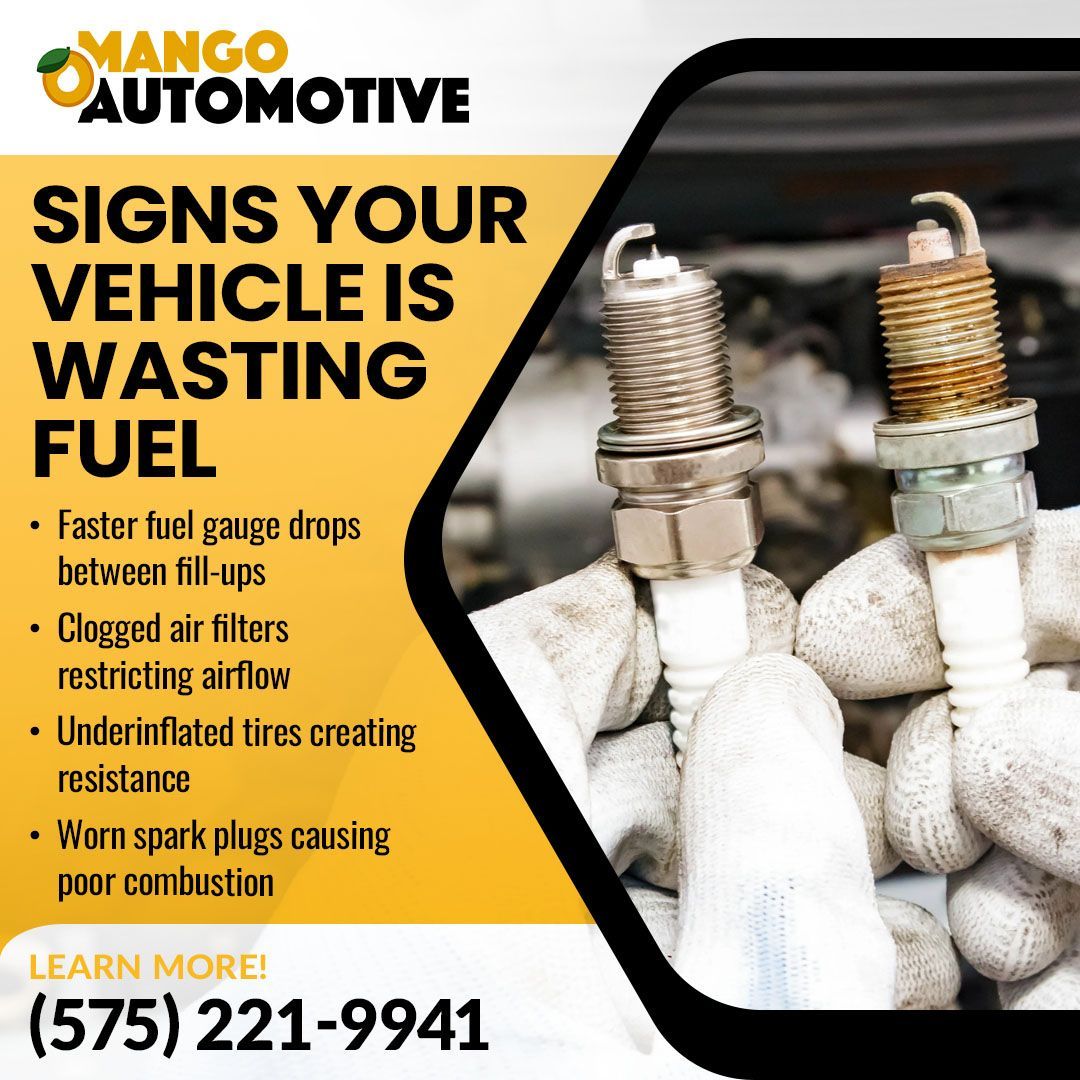Common Causes of Reduced Fuel Efficiency and How an Auto Repair Shop Can Help
Watching your gas gauge drop faster than usual? Reduced fuel efficiency doesn't happen overnight. It builds gradually as various vehicle components wear down or malfunction. Understanding what causes poor fuel economy helps you catch problems early, before they drain your wallet at the pump.
Small issues like dirty air filters, worn spark plugs, or low tire pressure force your engine to work harder, burning more fuel to maintain the same performance. At
Mango Automotive & Diesel, our
auto repair in Las Cruces focuses on helping drivers identify and fix fuel efficiency problems. Our technicians use diagnostic equipment to pinpoint which components are affecting your fuel economy, then recommend the repairs that will give you the biggest improvement. Getting these issues addressed saves money on gas and prevents wear on other engine parts.

What Causes Poor Fuel Efficiency
Fuel efficiency drops when your engine can't burn fuel properly or when it has to overcome unnecessary resistance. Your engine needs the right mix of air and fuel to run efficiently. When sensors fail or filters get clogged, this balance breaks down. Your engine compensates by using more fuel, which shows up as reduced gas mileage. Worn parts also create friction and drag. Your engine must overcome this resistance, requiring extra fuel to maintain speed. Tracking fuel economy helps you spot these gradual declines and know when to visit an auto repair shop for diagnosis.
Air Intake System Problems
Dirty or Clogged Air Filters
Your engine needs air to burn fuel. The air filter removes dust, pollen, and debris before they can enter your engine. Over time, the filter fills with contaminants and restricts airflow.
When the air filter is blocked, your engine has to work harder to get the air it requires. The engine receives less oxygen than necessary, and your car's computer responds by adding more fuel to compensate. This wastes gas without improving performance.
Most manufacturers recommend replacing air filters every 12,000 to 15,000 miles. Dusty driving conditions in areas like Las Cruces may require more frequent changes. You can often tell if your filter needs replacement just by looking at it. A heavily soiled filter appears dark and clogged with debris.
Faulty Mass Airflow Sensors
The mass airflow sensor tells your car's computer how much air is entering the engine. Based on this information, the computer decides how much fuel to add. When this sensor gets dirty or fails, it sends the wrong information. Your engine might receive too much or too little fuel for the amount of air present.
Signs of mass airflow sensor problems include rough idling and hesitation when you press the gas pedal. Your fuel economy also drops. The check engine light often turns on when the sensor malfunctions.
Auto repair technicians can test the sensor with diagnostic equipment to determine if it needs cleaning or replacement.
Throttle Body Buildup
The throttle body controls how much air flows into your engine based on how far you press the gas pedal. Over time, carbon deposits and oil residue build up inside. This restricts airflow and disrupts the air-fuel mixture.
When the throttle body gets dirty, your engine struggles to run smoothly. You might notice the engine acting up at stop lights or feeling sluggish when you accelerate. Throttle body cleaning removes these deposits and restores proper airflow, improving idle quality and fuel economy.
Fuel System Issues
Clogged Fuel Injectors
Fuel injectors spray fuel into your engine's combustion chambers. These injectors have tiny nozzles that can become clogged with deposits over time. Clogged injectors disrupt the fuel spray pattern, causing incomplete combustion and wasted fuel.
You might notice rough idling, engine hesitation, and reduced acceleration. Your gas mileage also drops, though the change happens gradually. Professional fuel injector cleaning uses specialized equipment to remove deposits and restore proper spray patterns. Severely clogged injectors may need replacement.
Weak Fuel Pump
The fuel pump moves gasoline from the tank to the engine. As pumps age, they lose pressure and struggle to deliver adequate fuel flow. A weak pump forces your engine to work harder. Signs of fuel pump problems include engine sputtering at high speeds and difficulty starting. You might lose power when accelerating. Fuel pump testing measures the pressure and flow rate. When pumps fail to meet manufacturer standards, replacement becomes necessary.
Dirty Fuel Filters
The fuel filter catches dirt and debris before they reach your injectors and engine. Like air filters, fuel filters eventually become clogged. This restricts fuel flow, causing the computer to make adjustments that waste gas.
Most vehicles need fuel filter replacement every 20,000 to 40,000 miles. Symptoms of a dirty fuel filter include difficulty starting, engine sputtering, and poor acceleration. These problems often get worse when climbing hills or merging onto highways.
Ignition System Failures
Worn Spark Plugs
Spark plugs create the spark that ignites the fuel in your engine. Each plug fires thousands of times per minute. The electrodes gradually wear down over time. Worn plugs create weak or inconsistent sparks, causing incomplete combustion and wasting fuel.
Replacing worn spark plugs often delivers one of the most noticeable improvements in fuel economy. You might also notice smoother acceleration and easier starting. Most spark plugs need replacement every 30,000 to 100,000 miles, depending on the type.
Faulty Ignition Coils
Ignition coils provide the electrical power needed to fire spark plugs. When coils fail or weaken, they don't produce enough power for proper combustion. This causes misfires that waste fuel and can damage other parts over time.
Symptoms include rough running, lack of power, and the check engine light turning on. Modern vehicles have individual coils for each cylinder. Diagnostic testing at an auto repair shop can identify which coil has failed. Replacing faulty coils restores proper ignition and improves fuel economy.
Bad Oxygen Sensors
Oxygen sensors monitor your exhaust gases and help your engine's computer maintain the correct air-fuel ratio. When these sensors fail or become contaminated, they send incorrect information to the computer. Your engine runs with too much or too little fuel, wasting gas.
You might also notice reduced power, rough idling, or a sulfur smell from your exhaust. The check engine light typically illuminates when oxygen sensors malfunction. Professional auto repair technicians can test the sensors to confirm which ones need replacement and help restore normal fuel economy.
Mechanical Issues Affecting Efficiency
Improper Tire Pressure
Underinflated tires increase rolling resistance and force your engine to work harder to maintain speed. This is one of the most common causes of poor fuel economy. Tires naturally lose air over time, and temperature changes accelerate this loss.
Check tire pressure monthly using an accurate gauge. The correct pressure appears on a sticker inside your driver's door jamb. Proper inflation also extends tire life and improves handling and safety.
Worn Brake Components
Dragging brakes create constant resistance that your engine must overcome. This happens when brake calipers stick or brake pads don't fully release. The constant friction generates heat and forces your engine to burn extra fuel.
Signs include pulling to one side, burning smells, and wheels that feel hot after short drives. Professional brake inspection identifies dragging components and worn parts that need replacement.
Transmission Problems
Transmission transfers engine power to the wheels at different speeds. Transmission issues like slipping gears, delayed shifts, or internal wear force your engine to work harder than necessary. This increases fuel consumption while reducing performance.
Symptoms include rough shifting, slipping between gears, and unusual noises during gear changes. You might notice your engine revving higher than normal without the car speeding up accordingly. Transmission diagnostics using advanced equipment can identify problems accurately. Catching problems early through regular maintenance prevents expensive repairs and maintains fuel efficiency.
Engine Oil Condition
Engine oil lubricates moving parts and reduces friction inside your engine. Old oil loses its lubricating properties and thickens, creating more resistance. This forces your engine to burn more fuel to maintain the same performance. Use the specific oil grade and follow the recommended oil change intervals as directed by the manufacturer. Regular oil changes maintain proper lubrication and help maximize fuel economy.
Improving Your Vehicle's Gas Mileage
Fixing existing problems and maintaining your vehicle properly improves fuel economy. If you notice check engine lights or obvious performance issues, have them diagnosed at an auto repair shop right away. Then focus on regular maintenance that prevents efficiency problems from developing.
Regular service catches small issues before they become expensive auto repairs. Air filter changes, oil changes, and tire pressure checks cost little but deliver real fuel savings. Professional diagnosis identifies hidden problems you can't detect yourself, especially issues affecting fuel delivery and combustion efficiency.
Your driving habits also affect
fuel economy. Quick starts and stops waste fuel. So does leaving your car running while parked. Combining trips, removing heavy items from your trunk, and maintaining steady speeds improve efficiency regardless of your vehicle's condition. When mechanical issues arise, visiting an auto repair shop in Las Cruces for proper diagnosis prevents guesswork and wasted money on unnecessary parts.
Professional Fuel Efficiency Diagnosis
Modern vehicles have computers that monitor hundreds of sensors and systems. When problems develop, the computer stores codes that identify which components have failed or aren't working correctly. Professional scanning equipment reads these codes and provides detailed information about what's wrong.
Technicians use this information along with their experience to diagnose fuel efficiency problems accurately. The codes might point to specific sensors, fuel system parts, ignition problems, or transmission issues. Professionals also perform actual testing of components beyond just reading codes. They test fuel pressure, ignition strength, airflow, and, when needed, conduct transmission diagnostics to check shift patterns and internal operation.
Fuel economy problems often have multiple causes. A professional efficiency analysis examines all systems that affect fuel consumption. Each system connects to the others. A problem in one area can create issues elsewhere. Professional technicians look at the complete picture and recommend repairs in the correct order.
Preventive Maintenance for Fuel Economy
Following manufacturer-recommended service intervals prevents most fuel efficiency problems. Your owner's manual lists specific services at different mileage points. These schedules exist because manufacturers know when components typically need attention.
Track your service history to know what's been done and what's due. Many auto repair shops provide reminders for upcoming maintenance. These reminders help you stay on schedule and prevent you from forgetting important services.
Tracking your fuel economy helps you detect problems early. Calculate your miles per gallon each time you fill up. Look for patterns or sudden changes. A consistent downward trend over several tanks indicates a developing problem. Catching this early lets you fix small issues before they become expensive auto repairs.
Mango Automotive & Diesel: Your Las Cruces Fuel Efficiency Experts
Complete Fuel Efficiency Services
At Mango Automotive & Diesel, we handle all aspects of fuel efficiency diagnosis and repair. Our technicians use modern diagnostic equipment to identify problems quickly. We test all systems that affect fuel economy, including air intake, fuel delivery, ignition, and mechanical components.
We explain what we find in clear terms and provide written estimates before starting work. This lets you make informed decisions about your repairs. When you choose us for auto repair in Las Cruces, you're choosing transparent service that prioritizes your needs.
Our shop uses quality parts for all repairs. We stand behind our work with a
60-month/60,000-mile warranty on most repairs. This includes 36 months/36,000 miles nationwide coverage plus an additional 24 months/24,000 miles at our locations.
Experienced Technicians
Our technicians have extensive experience diagnosing and repairing fuel efficiency problems. We've helped countless Las Cruces drivers save money at the pump. Our technicians stay current with automotive technology and receive ongoing training on diagnostic techniques and repair procedures.
We work on all makes and models. We have the skills and resources to address your fuel efficiency problems, whether you drive a sedan, truck, or SUV. From basic maintenance to complex
transmission diagnostics in Las Cruces, we provide the expertise you need.
Honest, Reliable Service
Mango Automotive & Diesel has built a reputation on honest service and reliable repairs. We recommend only the repairs you actually need. We provide clear communication throughout the repair process. You'll know what we're doing and why. We involve you in decision-making about parts and repair options, helping you understand your choices. If we discover additional problems during repairs, we'll contact you before proceeding.
Our team treats every customer with respect and answers your questions patiently. Whether you need simple maintenance or complex repairs like transmission diagnostics in Las Cruces, we approach every service with the same honesty and care. Our commitment to quality shows in our warranty coverage, too. We back most repairs with up to 60 months/60,000 miles of protection, giving you confidence that your investment is protected.
Our customers notice the difference. As one
satisfied customer put it: "They worked with me to find a way to get me a part that I could afford and involved me in the decision. Everyone in the shop is friendly and respectful, and they topped off my good experience by giving me a 5-year warranty on parts and labor."

Protect Your Wallet and Your Vehicle
Reduced fuel efficiency costs you money every time you drive. Small problems grow into expensive repairs when ignored. Tracking your fuel economy and addressing problems promptly saves money in both the short and long term.
Professional diagnosis identifies exactly what's causing your fuel economy problems. Targeted repairs fix the root causes rather than just treating symptoms. Quality work prevents repeated visits and wasted money on partial solutions.
Don't let poor fuel economy drain your budget. Contact Mango Automotive & Diesel today at
(575) 221-9941 to schedule your fuel efficiency diagnostic appointment. When you need trusted auto repair in Las Cruces, our experienced technicians will identify the problems affecting your fuel economy and recommend the most effective repairs for your situation and budget. Stop wasting money at the pump and get your vehicle running efficiently again.














